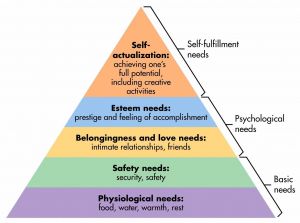Maslow's hierarchy
Everyone is driven to do stuff by a need, however, some needs come before others. Maslow, an American psychologist from the early 1900s, suggested that there is a defined hierarchy (see Figure 1), where simpler needs at the bottom have to be fulfilled before a person moves to the next, stage above. For instance, if you are hungry you buy some food, if you are thirsty you buy water. Once these basic needs (in purple - Figure 1) are met, then you can move up towards psychological needs such as building relationships and esteem.
Maslow's Hierarchy and Environmentalism
In relation to the ecological crisis, which according to moral relativism should be the prime issue on everyone's agenda, however, it's not. Maslow shows, basic human needs need to be met before people can address anything else. And with about 9.2% of the world, or 719 million people, living in extreme poverty, lacking food, safe drinking water, sanitation facilities, health, shelter, and education. It is impossible to think that our collective environmental issues will be faced before a billion people have access to clean drinking water.
So the earth is doomed? No there is definitely room for hope, and there are some great potential solutions on the horizon such as Universal Basic Income, which is where a central body provides the lower rungs of human need [1] and has been shown to allow people to not behave in environmentally destructive work patterns and concentrate on other things. However, focusing on the future instead of now slips into technoutopianism, and possible solutions whilst theoretically sound will not meet the immediate need for action.
Our best bet, is to change what we can control. If this is done within our locality and then propagated collectively across the world we can make a difference. However to start doing this we need to be able to change people's minds, unlearn bad habits and learn new ones. The most effective means at our disposal to do this is to first understand the issue. What you will find is that it is convoluted, there are first a wide range of logical fallacies, cognitive biases and popular delusions that persist among us. Once understood and identified we need to help induce pivotal mental states to help people unlearn bad habits and then refocus on new transparent systems that will get us out of this mess.
References
- ↑ What we know about Universal Basic Income: A cross- synthesis of reviews - Stanford University. Basic Income Lab, by Rebecca Hasdell, published JULY 2020, accessed on 9 July 2023 via: https://basicincome.stanford.edu/uploads/Umbrella%20Review%20BI_final.pdf
